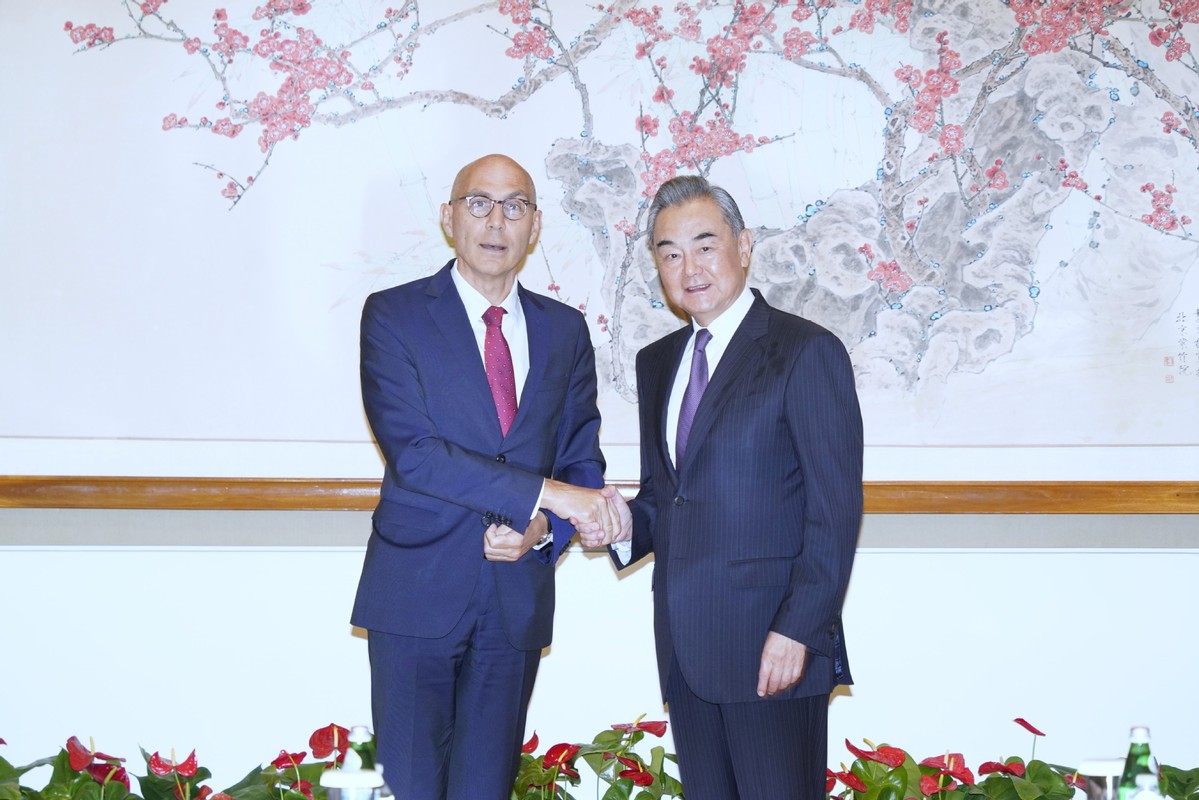
Foreign Minister Wang Yi , also a member of the Political Bureau of the Communist Party of China Central Committee, meets with United Nations High Commissioner for Human Rights Volker Turk in New York on Tuesday. [Photo/Xinhua]
Sept. 29, 2024 -- Chinese Foreign Minister Wang Yi said on Wednesday the political manipulation of human rights issues by a few countries is becoming increasingly unpopular across the world.
Wang, also a member of the Political Bureau of the Communist Party of China Central Committee, made the remarks when meeting with United Nations High Commissioner for Human Rights Volker Turk and multiple countries' foreign ministers on the sidelines of the UN General Assembly in New York.
More than 100 countries have voiced their support for China's position and opposed the politicization of human rights at the 57th session of the United Nations Human Rights Council held in Geneva on Tuesday, said Wang.
During the session, nearly 80 countries, including many Muslim nations, delivered a joint statement supporting China, and more than 20 other countries expressed their support in various ways, backing China's just position when a few countries, including the United States, used Xinjiang-related issues to attack and smear China's human rights situation.
The vast majority of Muslim countries have long seen through the tricks of the United States and understand that it is merely using human rights as a pretext to interfere in the internal affairs of China and other developing countries, he added.
Wang said that the clear support from more than 100 developing countries at the UNHRC is not only to defend China's legitimate rights but also to uphold international fairness and justice, safeguard the common interests of developing countries, and protect the fundamental principle of noninterference in internal affairs in international relations, said Wang.
Also on the sidelines of the 79th session of the United Nations General Assembly in New York, Wang met with Josep Borrell, a high representative of the EU for foreign affairs and security policy.
Mutual trust
Wang expressed appreciation for Borrell's commitment to actively developing relations with China; viewing the country's development objectively and positively, and promoting China-EU cooperation and mutual trust.
Borrell also emphasized that China and Europe are partners, not opponents. "China appreciates that," said Wang.
China and Europe should "strengthen mutual trust, enhance cooperation, adhere to mutual respect, learn from each other, and leverage each other's strengths to compensate for their weaknesses", said Wang, adding this will "contribute to stabilizing international and regional situations and promoting human development and progress".
"We hope the EU will maintain strategic autonomy, eliminate external interference, and promote the healthy and stable development of China-EU relations," Wang said.
The meeting came as the European Commission was planning to impose tariffs of up to 35.3 percent on Chinese-made electric vehicles, on top of the EU's standard 10 percent car import duty.
Germany's Economy Minister Robert Habeck last week called for the EU and China to reach a political solution on the issue of tariffs on electric vehicles.
Spanish Prime Minister Pedro Sanchez earlier this month also said at a news briefing before concluding his visit to China that Spain is reevaluating its stance on the EU's import tariffs on Chinese-made EVs.
Sanchez urged both EU member states and the European Commission to reconsider their approach and stressed the importance of Brussels and Beijing finding a compromise to prevent a trade war.
Borrell said that China is already a strong country and will continue to grow stronger. "The world needs China, and Europe should strengthen cooperation with China," he said. "Countries need to work together to maintain peace and security."
Xinhua contributed to this story.


